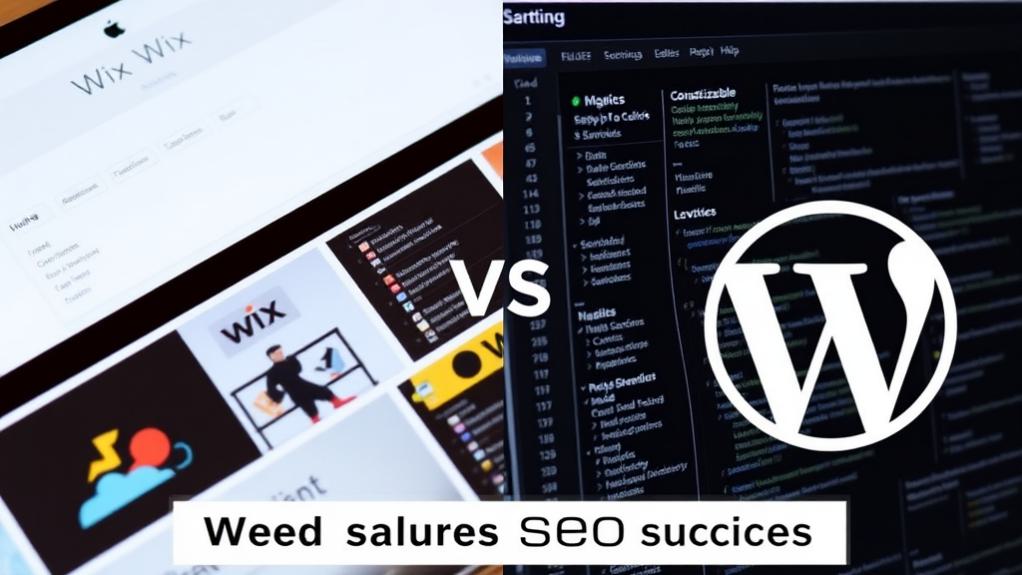
Wix Vs. WordPress: Which Is Better For SEO?
When you're deciding between Wix and WordPress for SEO, WordPress often takes the lead. It offers powerful SEO plugins, flexible permalinks, and extensive customization options to enhance your site's visibility. Wix's user-friendly interface and built-in SEO tools make it tempting, especially for beginners, but it has limitations in advanced techniques. If you're serious about long-term growth and scalability, WordPress might just be your best bet. However, Wix is great for quick setups without fuss. Consider your specific needs and goals, and you might find there's even more to uncover.
Overview of Wix

When it comes to building a website, Wix stands out with its user-friendly interface and intuitive design tools.
You'll love how easy it's to customize Wix templates, making your eCommerce site visually appealing. However, keep in mind some Wix limitations; it can be restrictive if you need advanced features.
On the bright side, Wix analytics help you track your site's performance effectively, while Wix marketing tools streamline your promotional efforts.
Plus, you can expect impressive Wix speed, ensuring your site loads quickly for visitors. If you ever run into issues, Wix support is readily available to assist you.
Don't forget to stay updated with Wix updates to take advantage of new features and improvements.
Overview of WordPress
When it comes to SEO, WordPress really shines with its powerful plugins designed to boost your site's visibility.
You'll appreciate the ability to customize your URL structures, making them more SEO-friendly and relevant.
Plus, its robust content management capabilities guarantee you can easily organize and optimize your content for maximum impact.
SEO-Friendly Plugins Available
While many website builders prioritize ease of use, WordPress stands out with its vast array of SEO-friendly plugins that can elevate your site's visibility.
These plugins, like Yoast SEO and All in One SEO Pack, help you implement effective keyword optimization strategies, ensuring you target the right phrases.
You'll also appreciate how they simplify the management of meta tags, which are essential for search engine rankings.
With just a few clicks, you can enhance your content's discoverability, making it easier for visitors to find you.
Plus, these tools provide valuable insights and suggestions, guiding you to optimize each page effectively.
Customizable URL Structures
One of the standout features of WordPress is its ability to create customizable URL structures, which can greatly boost your site's SEO performance.
You can optimize your URLs for keywords, aligning them with your content and enhancing keyword optimization. This flexibility allows you to establish a clear URL hierarchy, improving site architecture and making navigation easier for both users and search engines.
By following SEO best practices, you can implement redirect management effectively and utilize canonical tags to prevent duplicate content issues.
Plus, well-structured URLs contribute to mobile optimization and can positively impact page speed.
With WordPress, you're not just building a website; you're crafting a powerful SEO tool that can help you achieve your online goals.
Content Management Capabilities
Content management capabilities in WordPress set it apart as a powerful platform for website creation and maintenance.
You've got robust content organization tools that help you maintain a clear content hierarchy. With features like media management, you can easily upload and manage images and videos.
User roles and permissions allow you to control who can edit or publish content, ensuring smooth collaboration. Plus, version control means you can revert to previous drafts if needed.
Content scheduling lets you plan posts ahead of time, keeping your site active even when you're not.
And with plugin integration, you can enhance your site's functionality for better content optimization and site navigation.
WordPress truly empowers you to take full control of your content strategy.
SEO Features of Wix

When you choose Wix for your website, you're not just getting a user-friendly platform; you're also tapping into a range of SEO features designed to help your site climb the search engine rankings.
Wix SEO tools simplify your optimization process, allowing you to easily manage your content strategy. One of the key Wix advantages is its mobile optimization, ensuring your site looks great on any device, which is essential for user experience.
While Wix limitations exist, like less flexibility in advanced SEO techniques, its speed and performance are generally impressive. Plus, Wix analytics provide valuable insights to refine your strategies.
With all these features, you can effectively enhance your site's visibility and drive more traffic.
SEO Features of WordPress
When it comes to SEO, WordPress offers a robust set of built-in tools that can give your site a serious edge.
You'll love the flexibility of plugins that let you easily enhance your SEO strategy, plus the customizable permalink structure lets you optimize URLs for better search visibility.
With these features at your fingertips, you're well-equipped to boost your site's performance.
Built-in SEO Tools
WordPress excels in providing a robust suite of built-in SEO tools that can greatly enhance your website's visibility.
With features like customizable permalinks, you can easily implement SEO best practices that improve your site's structure and user experience. Plus, you get intuitive options for adding meta titles and descriptions, making keyword optimization a breeze.
You can also create SEO-friendly headings and alt text for images, ensuring search engines understand your content better.
These tools empower you to optimize every aspect of your site without needing extensive technical skills. By leveraging these built-in features, you can effectively boost your website's ranking and reach your target audience more efficiently.
WordPress truly sets you up for SEO success!
Plugin Flexibility
With a vast library of plugins at your fingertips, you can easily supercharge your WordPress site's SEO capabilities. This flexibility is one of WordPress's standout features.
You can choose from various plugins that enhance your site's performance, optimize your content, and improve your search visibility. Plus, plugin integration is a breeze, allowing you to combine multiple tools seamlessly.
Whether you're looking for SEO analytics, keyword optimization, or schema markup, there's a plugin for that.
Also, with excellent plugin compatibility, you won't have to worry about conflicts or issues that can arise in other platforms. This means you can focus on growing your site without getting bogged down by technical headaches.
WordPress truly empowers you to optimize your site effectively.
Customizable Permalink Structure
A well-structured URL can make all the difference in your site's SEO performance. With WordPress, you have the power of customizable permalink structures that enhance your SEO strategies.
By optimizing your permalinks, you can create a clear URL hierarchy that improves user behavior, making it easier for visitors to navigate your site. This is essential for effective keyword targeting, as a well-formed URL can include relevant keywords that boost your visibility in search results.
Plus, good permalink optimization supports your overall site architecture, ensuring search engines can crawl your content efficiently.
Customization and Flexibility

Customizing your website can make all the difference in how effectively you connect with your audience.
With WordPress, you have extensive theme selection and design options, allowing for unmatched user control. You can tap into third-party integrations and enjoy coding access, giving you the flexibility to create a truly unique site.
Wix, while user-friendly, has functionality limits that can hinder your scalability potential. If you're aiming for advanced mobile optimization, WordPress offers more robust solutions.
Ultimately, your choice impacts how well you can tailor your website to fit your vision and goals.
User Experience and Learning Curve
User experience plays an essential role in how you engage visitors on your website, and the learning curve of each platform can greatly influence that.
With Wix, you'll find a more intuitive drag-and-drop interface that makes design accessibility a breeze. You can create stunning sites quickly, which boosts user engagement right from the start.
On the other hand, WordPress offers greater flexibility but comes with a steeper learning curve. You might spend more time exploring its features and plugins, which can be frustrating if you're not tech-savvy.
Ultimately, if you want a seamless experience that prioritizes user engagement, Wix might be your best bet. However, if you're willing to invest time in learning, WordPress can provide unparalleled customization.
Cost Considerations for SEO

When you're weighing the benefits of Wix and WordPress for your website, cost considerations for SEO can't be overlooked.
With WordPress, you might invest more upfront, but it often pays off in the long run through advanced features like analytics tracking and robust local SEO options.
Wix is a budget-friendly choice, but you may find limitations in keyword research tools and competitive analysis.
For effective content optimization and a solid backlink strategy, WordPress tends to offer more flexibility.
Don't forget about site speed and mobile optimization—both of which are essential for SEO success.
Ultimately, consider how much you're willing to spend versus the potential return on investment in search visibility and traffic.
Conclusion
In the battle of Wix versus WordPress for SEO, you'll find two distinct paths. Wix offers simplicity and built-in tools, perfect for those who want quick results without the hassle. On the flip side, WordPress gives you unmatched flexibility and control, ideal for those willing to invest time for greater rewards. It all boils down to your priorities—if you crave ease, go with Wix; if you seek depth, WordPress is your best bet. Choose wisely!